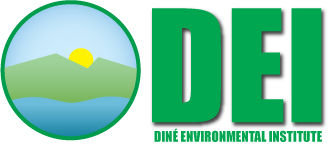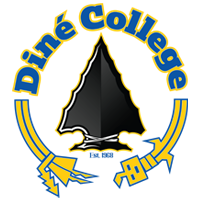About Diné Environmental Institute
The increased awareness of the science, math, environmental, and technological fields of profession are a primary goal for DEI. With research based learning and a focus on cirriculum development, we aim toward a progressive system of student learning, adhering to the college mission so each student will develop into a determined, self-reliant student in the science, math, environmental, and technological fields.

Diné Environmental Institute Research & Outreach (DEI)
Diné College and the Board of Regents worked in cooperation with the Navajo Nation Council to establish the Diné Environmental Institute Research and Outreach at Shiprock North Campus in 2001 with support through the Navajo Nation Council (Resolution # CAP -21-01) and the Education Committee of the Navajo Nation Council (Resolution ECMA – 36-00). DEI has remained consistent with the Mission of Diné College to promote a positive impact on students.
DEI, with funding through Federal Cooperative Grants, has been utilizing and strengthening Diné College’s Science, Technology, Engineering and Math ( STEM) programs to support Diné College students through greater attention to cultural relevance, scaffold learning and field research-based and classroom instructional deliveries. Key to these goals is the understanding of the traditional Diné process and method of research and analysis using core ancient Diné principles and values which guide environmental research and education. The Diné concept of and relationship to the environment and the natural elements of life are strongly linked to the use of core ancient Diné principles and values which guided environmental research, curriculum and Math/Science (STEM) approaches. Educational sessions obtained from these research activities are taken into the College classrooms, K-12 schools, community and other professional entities.
Diné Environmental Institute holds considerable promise for Diné Interns advancing real-life practical applications drawn from the philosophical strengths of Navajo culture to the understanding of issues and to the generation of solutions to the major contemporary issues of society – both Navajo and national. DEI maintains strong semester and summer internship opportunities for STEM students. The Goals of the DEI Internship Program are:
- To encourage students to develop a strong interest in science, math and/or engineering and to complete Associate of Science and/or Bachelor degrees.
- To prepare students to transfer to a four-year college or university and complete Graduate degree programs in STEM.
- Through the BIO 485 and BIO 408 academic internship and an intensive ten (10) week hypothesis-driven annual summer internship program, provide real-life mentored research experiences for students at national laboratories, partnering federal agencies/universities and local communities to expose students to activities commonly encountered in scientific careers.
- To encourage Native American students to return to their communities as scientists and engineers.
The sustainability of DEI has proven by the growth of University partnerships, research experiences and internship for Diné students.
Cove Livestock Study Quality Assurance Project Plan
Superfund terminologies/definitions & Diné Glossary:
As a part of the Tronox clean-up activities, DEI developed a Diné Language Glossary on Superfund project terminologies. This Glossary will assist Diné interpreters and translators to better communicate with impacted Diné communities and promote community participation and input.
Diné Language Translations of Tronox-Specific Terminologies
DEI Research Projects and Resources:
www.epa.gov/navajo-nation-uranium-cleanup/cove-area-mines
www.epa.gov/navajo-nation-uranium-cleanup
http://sric.org/nbcs/docs/NBCS_overview_063014.pdf
https://superfund.arizona.edu/core/community-engagement/gold-king-mine-spill
Dine’ College Book Chapter 2011 Dr. Jody Waugh
Navajo Nation Stove Exchange Study
